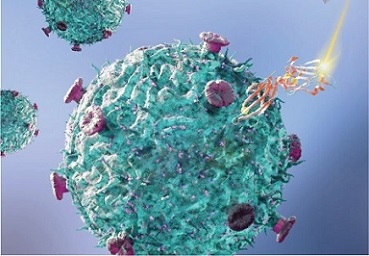Study Discovers That Unfolded Protein Response Components IRE1α And XBP1 Play Key Roles In Human Coronavirus Infections Including SARS-CoV-2!
COVID-19 News – Unfolded Protein Response Components IRE1α And XBP1 Jun 13, 2023 2 years, 8 months, 20 hours, 23 minutes ago
Study Uncovers Key Mechanisms Behind Human Coronavirus Pathogenesis and Reveals Potential Therapeutic Targets
COVID-19 News: The ongoing COVID-19 pandemic caused by the novel severe acute respiratory syndrome coronavirus-2 (SARS-CoV-2) has highlighted the urgent need to comprehend the cellular processes involved in human coronavirus replication and their impact on disease severity. A recent study conducted by researchers at the University of Washington in Seattle-USA has shed light on this subject, revealing the critical roles played by two cellular components of the unfolded protein response (UPR): IRE1α (Inositol-requiring enzyme 1alpha) and XBP1 (X-box binding protein-1). The findings have implications for understanding the pathogenesis of severe human coronavirus infections, including SARS-CoV-2.
 Unfolding the Unfolded Protein Response
Unfolding the Unfolded Protein Response
During viral infections, including those caused by coronaviruses, the endoplasmic reticulum (ER) undergoes stress due to viral replication processes. In response to this ER stress, cells activate the unfolded protein response. One of the key components of this response is IRE1α, a protein that initiates the non-conventional splicing of XBP1 mRNA. The spliced form of XBP1 encodes a transcription factor that induces the expression of ER-related genes. Interestingly, the study found that the IRE1α-XBP1 pathway is activated in association with risk factors for severe human coronavirus infection, such as diabetes, hypertension, aging, and obesity.
IRE1α and XBP1's Role in Human Coronavirus Infections
The study team conducted experiments using cultured cells infected with two human coronaviruses: HCoV-OC43 and SARS-CoV-2. They observed robust activation of the IRE1α-XBP1 branch of the unfolded protein response in these infected cells. To further investigate the role of IRE1α and XBP1 in viral replication, they utilized IRE1α inhibitors and genetically knocked down these host factors. The results demonstrated that IRE1α and XBP1 are essential for optimal replication of both human coronaviruses.
Moreover, the study revealed that ER stress-inducing conditions alone were sufficient to enhance human coronavirus replication. Furthermore, the researchers observed significantly elevated levels of XBP1 in the circulation of severe COVID-19 patients. These findings underscore the importance of IRE1α and XBP1 in human coronavirus infections and provide valuable insights into potential therapeutic targets.
Implications and Future Directions
Understanding the cellular processes co-opted by human coronaviruses and identifying mechanisms underlying severe disease are crucial for developing effective treatments. The study's findings highlight the critical roles of IRE1α and XBP1 in promoting human coronavirus replication, including SARS-CoV-2. The researchers suggest that targeting IRE1α could offer a promising therapeutic strategy for combating severe coronavirus infections.
The study team also noted that IRE1α activation and XBP1 splicing occur during infection with other coronaviruses, albei
t with variations. For instance, SARS-CoV, a closely related betacoronavirus to SARS-CoV-2, limits IRE1α activation and XBP1 splicing in infected cells. Future studies may unveil the specific determinants of differential IRE1α regulation among human coronaviruses and various infection conditions. This was covered in a previous
COVID-19 News story.
https://www.thailandmedical.news/news/sars-cov-2-is-different-from-all-other-betacoronaviruses-in-that-it-only-partially-activates-the-ire1-alpha-xbp1-endoplasmic-reticulum-stress-pathway
Furthermore, the study highlighted the potential implications of IRE1α and XBP1 in cytokine responses and inflammation. XBP1 has been found to bind to promoters of cytokines, including interleukin 6 (IL-6), a key player in severe COVID-19. The identification of this connection suggests that the IRE1α-XBP1 pathway may contribute to the dysregulated immune response observed in severe coronavirus infections.
Targeting the IRE1α-XBP1 Pathway: A Potential Therapeutic Approach
Given the crucial role of the IRE1α-XBP1 pathway in human coronavirus replication and its potential involvement in cytokine dysregulation, targeting this pathway holds promise as a therapeutic strategy. The study demonstrated that pharmacological inhibition of IRE1α using small-molecule inhibitors significantly reduced viral replication in infected cells. This suggests that inhibiting IRE1α could be a viable approach to limit viral replication and mitigate disease severity in human coronavirus infections.
In addition to directly targeting IRE1α, modulating the downstream effects of XBP1 could also be explored as a therapeutic avenue. As XBP1 has been linked to the expression of cytokines, targeting its activity may help regulate the excessive immune response observed in severe coronavirus infections. However, further research is needed to elucidate the specific mechanisms by which XBP1 influences cytokine expression and to develop targeted interventions.
Broader Implications for Coronavirus Research
The findings of this study not only provide insights into the pathogenesis of human coronavirus infections but also have broader implications for coronavirus research as a whole. The IRE1α-XBP1 pathway is conserved across various coronaviruses, including SARS-CoV-2 and other related strains. Understanding how this pathway contributes to viral replication and disease severity can inform the development of broad-spectrum antiviral strategies that could be effective against multiple coronaviruses.
Furthermore, the study underscores the importance of considering host factors and cellular processes in the context of viral infections. While much research has focused on viral factors, targeting host factors that are hijacked by the virus could provide alternative strategies for therapeutic intervention. The IRE1α-XBP1 pathway represents one such host factor that plays a critical role in human coronavirus infections.
Conclusion
The study findings highlighting the roles of IRE1α and XBP1 in human coronavirus infections, including SARS-CoV-2, has deepened our understanding of the intricate cellular processes involved in viral replication and disease pathogenesis. The findings underscore the significance of the unfolded protein response and its components in facilitating viral replication and promoting a dysregulated immune response. Targeting the IRE1α-XBP1 pathway offers a potential therapeutic approach to limit viral replication and mitigate disease severity in severe coronavirus infections.
The study findings were published in the peer reviewed journal: mBIO
https://journals.asm.org/doi/10.1128/mbio.00540-23
For the latest
COVID-19 News, keep on logging to Thailand Medical News.
Read Also:
https://www.thailandmedical.news/news/study-finds-that-sars-cov-2-orf3a-interacts-with-the-clic-like-chloride-channel-1-clcc1-and-triggers-an-unfolded-protein-response
https://www.thailandmedical.news/news/the-interplay-between-sars-cov-2-and-the-endoplasmic-reticulum-and-the-resulting-covid-19-symptoms-and-long-covid-manifestations
https://www.thailandmedical.news/news/study-finds-orf8-protein-of-sars-cov-2-induces-endoplasmic-reticulum-stress-like-responses-and-facilitates-virus-replication-by-triggering-calnexin
https://www.thailandmedical.news/news/breaking-university-of-sao-paulo-study-alarmingly-reveals-that-sars-cov-2-induces-er-stress-activated-unfolded-protein-reaction-resulting-in-cell-deat
https://www.thailandmedical.news/news/covid-19-breakthrough-canadian-study-on-unfolded-protein-response-upr-uncovers-thiopurines-to-stop-viral-replication-in-human-coronaviruses
